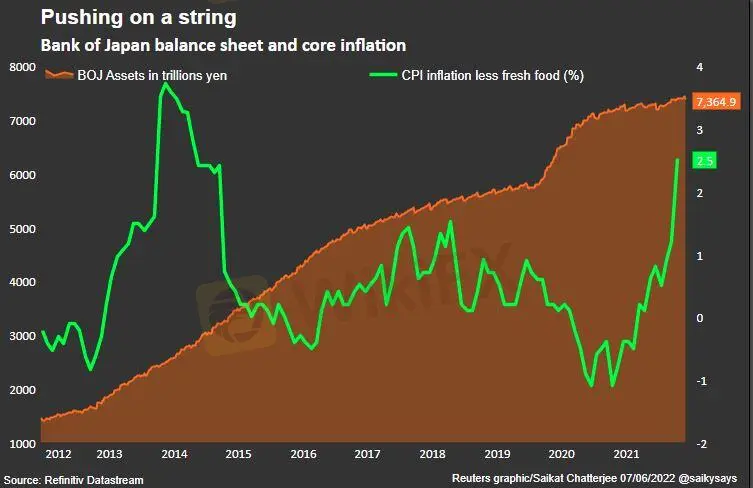简体中文
繁體中文
English
Pусский
日本語
ภาษาไทย
Tiếng Việt
Bahasa Indonesia
Español
हिन्दी
Filippiiniläinen
Français
Deutsch
Português
Türkçe
한국어
العربية
Marketmind: This is what it sounds like when doves cry
Abstract:Operation shock and awe: June 2022 will most likely be remembered as the month central banks finally decided to bring out the big guns to shoot down soaring inflation.

Within 48 hours, the U.S. Federal Reserve made its biggest rate hike since 1994, the Swiss National Bank raised its policy interest rate for the first time in 15 years and the European Central Bank announced fresh emergency tools to support the blocs indebted south while it tightens monetary policy.
The Bank of England also rose borrowing costs for the fifth time since December and its benchmark interest rates is now at its highest since January 2009 even as the economy lurches into recession.
With the glaring exception of the Bank of Japan which has steadfastly stuck to its ultra-dovish policy, the hawks of monetary policy are now clearly running the show globally.
A quick look at the state of financial markets gives a pretty clear idea of, as late musician Prince used to sing, what it sounds like when doves cry.
The yield of Germany‘s bund’s at one point yesterday surged by a whopping 20 basis point, the Swiss franc jumped a rare 2% against the euro and a multitude of equity indexes confirmed a bear market.
All in all world stocks are heading for their worst week since the March 2020 pandemic meltdown as investors worry about the economic consequences of fast-rising interest rates.
Speaking of which, the Philadelphia Federal Reserves manufacturing activity index got its first negative reading since the early months of the coronavirus pandemic and the outlook for the next six months was the lowest since February 2008.
Adding to the gloom, U.S. homebuilding fell to a 13-month low in May and permits tumbled, suggesting the housing market was cooling as surging mortgage rates reduce affordability for many first-time homebuyers.

Key developments that should provide more direction to markets on Friday:
– Shanghais economy shrinks again in May but at slower pace
– Britains Tesco reaffirms profit guidance despite sales fall
– Swedens Riksbank policy meeting
– U.S. industrial production
– Santander appoints Hector Grisi as new CEO

Disclaimer:
The views in this article only represent the author's personal views, and do not constitute investment advice on this platform. This platform does not guarantee the accuracy, completeness and timeliness of the information in the article, and will not be liable for any loss caused by the use of or reliance on the information in the article.
Read more

Top 10 Trading Indicators Every Forex Trader Should Know
Master the top 10 Forex trading indicators to analyze real-time Forex quotes, trends, and market signals. Learn strategies to boost accuracy and avoid mistakes.

Geopolitical Events: What They Are & Their Impact?
You've heard many times that geopolitical events have a significant impact on the Forex market. But do you know what geopolitical events are and how they affect the FX market? Let us learn about it today.

Why Do You Feel Scared During Trade Execution?
Trade execution is a pivotal moment for traders. It is when analysis turns into action, and potential profits or losses become reality. However, for many traders, this moment is accompanied by fear. Why does this happen, and how can you address it?

WikiEXPO Global Expert Interview: Simone Martin—— Exploring Financial Regulation Change
In the midst of financial innovation and regulation, WikiGlobal, the organizer of WikiEXPO, stays abreast of industry trends and conducts a series of insightful and distinctive interviews on pivotal topics. We are delighted to have the privilege of inviting Simone Martin for an in-depth conversation this time.
WikiFX Broker
Latest News
Volkswagen agrees deal to avoid Germany plant closures
Geopolitical Events: What They Are & Their Impact?
Top 10 Trading Indicators Every Forex Trader Should Know
TradingView Launches Liquidity Analysis Tool DEX Screener
MultiBank Group Wins Big at Traders Fair Hong Kong 2024
WikiEXPO Global Expert Interview: Simone Martin—— Exploring Financial Regulation Change
'Young investors make investment decisions impulsively to keep up with current trends' FCA Reveals
Why Do You Feel Scared During Trade Execution?
CySEC Settles Compliance Case with Fxview Operator Charlgate Ltd
Scope Markets Review: Trustworthy or Risky?
Currency Calculator


